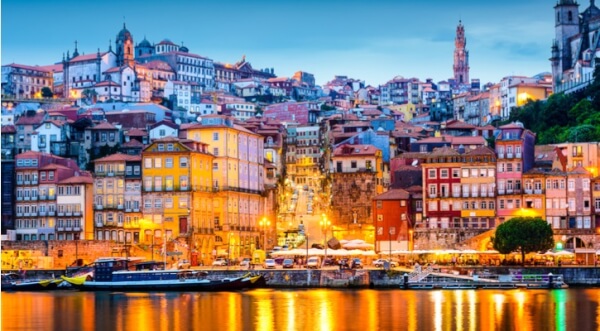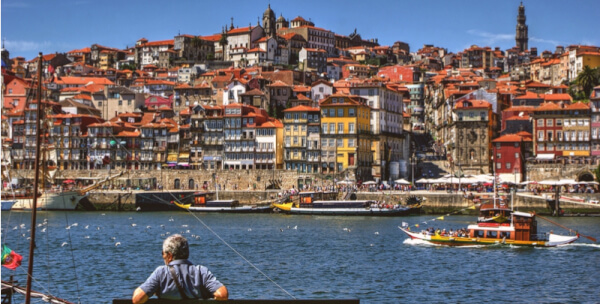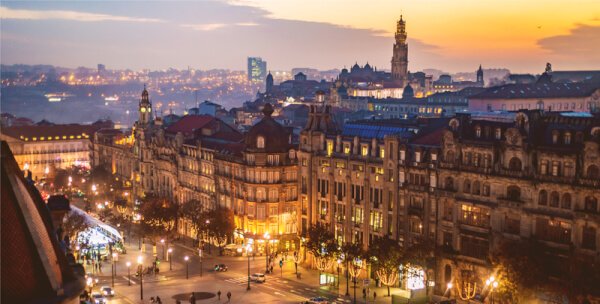Pros and cons of living in Portugal? You'll wanna read this.
Have you ever dreamed of moving abroad? It’s an appealing prospect for many, and there are a lot of reasons to consider it. People move to different countries...

Portugal has a fantastic climate, beautiful beaches, and a fun, welcoming culture - a combination which has long drawn in holidaymakers and expats. Despite being hit hard by the global financial crisis, Portugal has been experiencing steady economic growth over the last few years. It’s therefore no surprise that Portugal’s cities are home to significant populations of new arrivals from abroad, who are living and working while enjoying the best Portugal has to offer.
If you’re planning on taking a job in Portugal you might need to get a work visa first. Use this guide to understand the details on acquiring a Portuguese work permit.
Your first priority should be to figure out if you need a work permit at all. In some cases, depending on your nationality and the role you’re going to work in, a permit may not be necessary.
Visas for Portugal are managed by the Immigration and Borders Service. Their website which is available in English, contains lots of useful information about arriving, living and working in Portugal as a foreigner. Full details of visa requirements for all EU countries are available from the EU immigration portal.
In most cases EU citizens won't need a work visa, but will have to register with the authorities and apply for a residence card if they intend to stay in Portugal for the long term. Most third country nationals will need to apply for a visa to live and work in Portugal, although there are several different routes to do this.
If you’re a third country national and require a visa to work legally in Portugal, you'll need to have a job arranged before you can travel. Your future boss will also be asked to prove that they tried to recruit the role within Portugal before making the offer to a foreigner, so the process can take some time.
To get your permit, your manager will have to submit the formal offer of employment to the authorities who’ll then start the visa process. You then can complete the application in your home country by visiting your local embassy.
Each embassy will have a slightly different process so it's important to check the requirements. Some will offer appointments while others might work on a ‘first come, first served’ basis.
In most cases, work visas can be issued for up to three years. If it's more suitable for your situation you might also apply for a residence visa, which allows you entry to Portugal with the intention of applying for a residence permit once there.
You’ll also be charged a fee to arrange your work visa or residence permit and to make any changes to the terms or length of your visa. The range of prices varies depending on the visa type and duration. The residence permit for a third country national will cost up to € 218.
The documents needed will vary slightly depending on the exact visa you’re applying for, and your country of residence. Details can be found on the immigration department website, but for a regular work permit you can expect to be asked for the following:
Completed application form
Two recent, identical photographs
Passport or other valid travel document
Valid residence visa
Evidence of the funds to support yourself
Proof of proposed accommodation
Permission for checking criminal records
Valid labour contract
Proof of your current tax situation
Document proving Social Security registration
You should check the exact requirements for your visa, with the local embassy you’re applying to, as there may be some variants you need to consider. For example, some embassies will require the application form to be signed with a member of staff acting as a witness.
Depending on the type of work you're planning on doing, it might be possible to apply for an EU Blue Card. Similar to the US Green Card, this document gives you the right to work across most EU member states (excluding Denmark, Ireland and the UK). To be eligible for a Blue Card, you must be from a country outside the EU, be highly skilled (typically meaning you have completed a bachelor's level university degree or have five years of senior professional experience), and have a binding job offer or active work contract.
The Blue Card application process is fast tracked by member states, meaning it's typically quicker than other forms of work visa application. However, it may still take up to three months. Although you start the application process online and through a single point of contact, the process may vary depending on your personal circumstances. The Blue Card network has a good website and offers support to applicants to help them understand the process. It should also be noted that the Blue Card Network itself doesn't issues cards or vet applications but it instead offers users support and a platform which prospective employers can consult to view individual profiles.
If you're going to Portugal to work for under 3 months, and are an EU citizen, you don't need a specific visa or residence card. If you’re a non EU citizen then you'll need to apply for a specific visa, which is issued for up to 6 months. There are certain further conditions which are detailed on the EU Border authorities website.
If you're in Portugal with a student visa, you may be allowed to work subject to the approval of the authorities. You’ll have to register with your local residence office and pay social security contributions. Also, unpaid work isn't allowed under this visa. After graduation, you’ll need to change your visa type to a residence permit which allows work, in order to get a job legally in Portugal.
If you’re coming to Portugal to work as a contractor or freelancer, you might need to get a temporary stay visa, or residence permit (if you’re planning on staying for a long time). The temporary stay visa is usually issued for a year initially, but can be extended. The residence permit is obtained by getting a short term residence visa for the purposes of entering the country, before making a residence permit application within Portugal.
Portugal has a ‘Golden Visa’ programme for people coming to the country to start businesses and make large investments. This visa, which entitles the holder to bring their family and ultimately apply for Portuguese citizenship if required, comes with a list of certain stipulations including investment of over €1 million or the creation of more than ten jobs. You might also be eligible if you’re investing in infrastructure or refurbishing older properties. Applications can be made online.
Whichever visa you intend to get you'll have to submit a suite of paperwork to back up your application. This will include evidence of your business plan as well as any contracts already in place and proof that you can support yourself while your business develops.
If you’re a third country national and have a residence permit, you can apply for visas for your family to join you in Portugal. If you have a temporary residence permit then family members would be issued a visa that is of the same length as yours.
To get a permit for family members, you must provide documents proving the family relationship and evidence that you can support your dependants. For the purpose of this family reunification programme, family is considered to be a spouse, dependant children including those who are adopted, elderly parents and minor brothers and sisters if they're in your care.
You have your paperwork in order and are travelling to Portugal, but don't forget there are a few more things to attend to. For these last pieces of administration, your employer might be able to help you once you arrive in Portugal to make sure the process runs smoothly and without delays.
Even if you don’t require a visa to work legally in Portugal, you might still need a residence card (Cartão de Residência) from the Portuguese Immigration Office (Serviços de Estrangeiros e Fronteiros). Usually this isn't needed if you're an EU citizen and in Portugal for under three months.
You might also have to sign up with Social Security (Segurança Social) and pay social security contributions. Check with your employer as they might be able to help you arrange this. Finally, you must get a tax code (Numero Fiscal de Contribuinte) from the Director General of Taxes (Direcçaõ-Geral dos Impostos) office in your local area.
To get the most of your money in Portugal, you'll want to open a bank account in Portugal, which you can do before you arrive.
Once you send money to Portugal, consider using a money conversion service like Wise to avoid unfair exchange rates. There's a small transparent fee, and when your money is converted from one currency to another you’ll get the real exchange rate - the same one you can find on Google. Not only that, but Wise receives and sends money via local bank transfers instead of internationally, further saving you money by cutting out hefty international transfer fees.
If your trip is short or opening a bank account in Portugal isn't an option, you can always withdraw money from your foreign account using a Portuguese ATM. Just keep in mind that it'll be more favourable to agree to be charged in the local currency, not your home currency.
Regardless of when you start your new job abroad, it should be fairly straightforward to get yourself a visa if you follow the right steps. Enjoy your new adventure!
*Please see terms of use and product availability for your region or visit Wise fees and pricing for the most up to date pricing and fee information.
This publication is provided for general information purposes and does not constitute legal, tax or other professional advice from Wise Payments Limited or its subsidiaries and its affiliates, and it is not intended as a substitute for obtaining advice from a financial advisor or any other professional.
We make no representations, warranties or guarantees, whether expressed or implied, that the content in the publication is accurate, complete or up to date.

Have you ever dreamed of moving abroad? It’s an appealing prospect for many, and there are a lot of reasons to consider it. People move to different countries...

If you’re thinking of moving to Portugal, you wouldn’t be the first. It’s the oldest country in Europe populated with beaches, mountains, and picturesque...

Considering a post-career stint in Portugal? In recent years, expatriates have flocked there for short and long-term stays. Retirees can find a welcoming...

If 3,300 hours of sunshine a year, beautiful blue flag beaches and a slower pace of life sound like your kind of thing, you may want to consider retiring in...